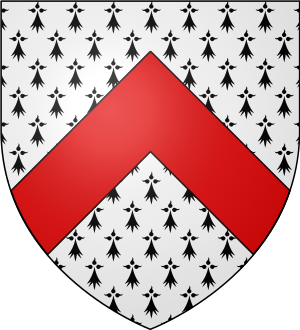James Tuchet, 7th Baron Audley facts for kids
Quick facts for kids
The Baron Audley
|
|
|---|---|

Arms of Tuchet: Ermine, a chevron gules
|
|
| Personal details | |
| Born |
James Tuchet
c. 1463 |
| Died | 28 June 1497 (aged 33–34) Tower of London, England |
| Cause of death | Executed |
| Resting place | Blackfriars, London, England |
| Spouses |
Margaret Darrell
(m. 1483)Joan Bourchier
(m. 1488) |
| Children |
|
| Parents |
|
James Tuchet, 7th Baron Audley (born around 1463, died 1497), was an important British nobleman. He is famous for being the only lord who fully joined the Cornish rebellion of 1497. This rebellion was against the rule of Henry VII of England.
James Tuchet helped lead the rebel army as it marched towards London. However, his army was defeated at the Battle of Deptford Bridge. He was captured and found guilty of treason, which means going against the king. He was then executed. His noble title was taken away, but it was given back to his son in 1512.
Contents
Who Was James Tuchet?
James Tuchet was born around 1463 at Heleigh Castle in Staffordshire, England. His parents were John Tuchet, 6th Baron Audley and Anne Echingham.
When his father passed away, James became the 7th Lord Audley on September 26, 1490. This meant he inherited his father's noble title.
James Tuchet's Family Life
Around 1483, James Tuchet married Margaret Darrell. She was the daughter of Richard Darrell. Together, they had a son named John Tuchet, 8th Baron Audley. John was born around 1483 and later inherited his father's title.
James Tuchet married a second time in 1488. His second wife was Joan Bourchier. She was the daughter of Fulk Bourchier, 10th Baron FitzWarin.
Why James Tuchet Disliked the King
James Tuchet's family, the Tuchets, had supported the House of York during the Wars of the Roses. These were a series of wars fought over who should be king of England. James's father had done well under the Yorkist kings, King Edward IV and King Richard III.
When James was a child, King Edward IV even made him a Knight Bachelor. This was an honor given to young noblemen.
Changes Under King Henry VII
However, things changed when Henry VII became king. Henry VII had defeated the Yorkist kings. Because of this, the Tuchet family was no longer favored by the new king.
Even though his family was not as wealthy as some other nobles, James Tuchet was still called upon to serve the king. In 1492, he had to join King Henry's army against the French. This led to the Siege of Boulogne. While the king got a good peace treaty, it was likely expensive for James.
Financial Troubles and Disagreement
James Tuchet was also asked to attend Parliament meetings starting in 1492. In 1496, he had to pay £200. This was a large sum of money. It was part of an agreement to ensure another nobleman, the Marquess of Dorset, stayed loyal to the king.
In early 1497, King Henry needed more money. He raised heavy taxes to build an army against the Scots and a rebel named Perkin Warbeck. James Tuchet did not agree with these new taxes. It was his job to collect these taxes in his area, and he was also ordered to provide 100 men for the king's army.
When a new uprising began in Cornwall later that year, James Tuchet felt that the rebels' complaints matched his own. He was unhappy with how the king was treating him and his family.
The Cornish Rebellion of 1497
The rebel army from Cornwall was led by a blacksmith named Michael Joseph, also known as An Gof. A lawyer named Thomas Flamank also helped lead the rebels.
James Tuchet met the rebel army when it reached Wells in Somerset. It seems he had already been in contact with An Gof and Flamank. Because he was a nobleman with military experience, the rebels chose him as their commander.
March to London
The rebel army marched towards London. They went through Salisbury and Winchester. Then they moved south, passing through Guildford. They hoped to gain more support from people in Kent. However, no new uprisings happened there.
The rebels reached Blackheath, near Deptford, in south-east London. Here, they faced King Henry's army. The king's forces were led by Lord Daubeny and the Earl of Oxford.
Many of the rebels were scared and wanted to give up to the king. It is said that An Gof, not Audley, insisted on fighting. After some rebels left, James Tuchet commanded an army that was much smaller than the king's. The king's army was also better equipped.
Defeat and Execution
The rebels were completely defeated in the Battle of Deptford Bridge. This battle happened on Saturday, June 17, 1497.
James Tuchet was captured on the battlefield. Like An Gof and Flamank, he was sent to the Tower of London. The king questioned them on June 19. A week later, An Gof and Flamank were tried and executed.
As a nobleman, James Tuchet was taken to Westminster to be sentenced. He was condemned to death. On Wednesday, June 28, 1497, he was taken to Tower Hill. His coat of arms was displayed upside-down and torn, showing his dishonor. He was then executed.
After his death, James Audley's lands were taken by the king. However, they were later given back to his son, John, in 1533. The Audley noble title was also taken away, but it was restored to John Tuchet in 1512.
 | Emma Amos |
 | Edward Mitchell Bannister |
 | Larry D. Alexander |
 | Ernie Barnes |

